 Politics
Politics
Premier promotes Cayman in special video for JMC
(CNS): The Cayman Islands premier has recorded a video to promote the Cayman Islands for this week’s overseas territory meeting in London. During the course of this week Alden McLaughlin and his ministerial colleague Wayne Panton will be flying the flag for Cayman at the table with FCO officials as the mother country engages in talks with all of its territories' leaders and discusses the continued relationship. With public finances at the fore, as well as issues such as conservation and the financial services sector, this year’s meeting will also see the OT leaders mingle with UK investors. The short video describes Cayman’s natural beauty as well as the economy and invites people to come see the islands for themselves. Go to video
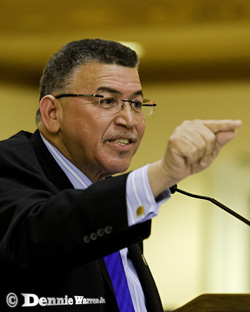
Mac denies politics of grants
 (CNS): The opposition leader has condemned Premier Alden McLaughlin for calling out and identifying students who received scholarship grants from his controversial Nation Building Fund and denied that they were awarded on the basis of partisanship. McKeeva Bush said that he may have known some of the students’ families but there was a committee composed of civil servants, including a nation building scholarship coordinator, which approved the money, and all of those who received the grants were deserving students. He admitted that some students were paid more but said that was because they were attending specialist schools.
(CNS): The opposition leader has condemned Premier Alden McLaughlin for calling out and identifying students who received scholarship grants from his controversial Nation Building Fund and denied that they were awarded on the basis of partisanship. McKeeva Bush said that he may have known some of the students’ families but there was a committee composed of civil servants, including a nation building scholarship coordinator, which approved the money, and all of those who received the grants were deserving students. He admitted that some students were paid more but said that was because they were attending specialist schools.
“Scholarships were never granted by the committee on political partisanship,” Bush told CNS following the revelations in the Legislative Assembly last week that some students had received more than three times the usual government scholarship annual amount and that money had gone to the children of UDP supporters.
“I don't know everyone who is UDP, PPM, C4C or any other political leaning. As a politician I have never operated in that way. That’s why I've been able to have support from across all spectrums to win eight consecutive terms and because I choose to help any and everyone who needs any assistance I can give.
"But I do know that scholarships were granted to very deserving students. I do know some families but … I will never divulge who they are. I have never done that and never will, as our students don't deserve that.”
Bush said there was no need for Alden McLaughlin to call anyone’s name. He said that making him (Bush) look bad was one thing but he should leave the students and their parents alone.
“The aim of the nation building scholarship was to ensure that students who are extra capable in the arts, sports or academics got a chance to progress. They could never do that with the Education Council grant of $20,000,” he said. “Surely you would not expect that a student going to the UCCI would receive the same amount as a student going to Miami Dade community college or other community college?”
He said students going to a community college would not get the same amount granted as a student who had the academic ability to get into Ivy League universities or to attend a school specialising in music and sport education and development.
“Naturally, some student received more help than others and more than the Education Council grant,” he said, justifying the large amounts given to a small group of students.
“That is what the nation building scholarship was designed to do. I'm proud that we could offer some help to the student and their families because every child should be given the opportunity to excel in their chosen career with their God given talent and abilities. Then come home and help build the country. That's a piece of the path to nation building,” Bush added.
During the Strategic Policy Statement debate last week, McLaughlin said that several grants of around $70,000 had been given and threatened to reveal the list of names, suggesting they were UDP supporters. However, it is understood that despite saying he intended to reveal the details, the premier stopped short of tabling the list of names. He did, however, indicate that one of the largest grants went to the daughter of Bush's political assistant when he was premier.
The government has now sought to regularise all the grants under the fund and at the start of the 2014/15 academic year the scholarships will be cut to be in line with all government scholarships. The grants to students not attending an institution or where they have failed to maintain the necessary grades will be stopped.
During the House meeting Bush took aim at McLaughlin for cutting the grants as he accused him of denying Caymanian students the opportunity of a decent education. As a result, the premier hit back and revealed more details on the controversial grants and challenged Bush to disprove the facts and show that he did not have a direct political hand in every grant.

Surplus growth predicted
(CNS): The Cayman Islands Government (CIG) can look forward to growing surpluses over the next few years, according to the finance minister, who has pointed to a surplus of almost $150 million for government at the end of 22016/17. Although government now has plans to reschedule the financial year in line with the calendar year, it is still predicting a continuous increase in operating surpluses for each year of this administration. Marco Archer said government should have a surplus of $123.5 million in 2014/15, $139 million in 2015/16 and finally $148.7 million in 2016/17. As well as vowing to cut costs and not add new fees or taxes, the minister said government companies and authorities would be under pressure to be more productive.
Delivering the Strategic Policy Statement to the Legislative Assembly and tabling the Medium Term Fiscal Strategy of the CIG for the Financial Years 2013-2017, which was sent to the UK before government delivered its full budget for 2013/14 and approved, Archer continued on the theme of prudent management of the public purse.
The minister said that government does not plan to introduce any new major revenue measures during the next three financial years but warned there may be some revisions to fees for existing services to reflect the cost of delivery. He forecast that with anticipated economic growth, government will earn approximately $655.3 million in 2014/15; $669 million in 2015/16 and $676.9 million in 2016/17.
Turning to expenditure, he said government had a responsibility to ensure that every dollar was well-spent and resources streamlined.
“We are adamant that by replacing waste and abuse in government with transparency and accountability and efficiency, our country will realize great savings in the medium and long term,” he said.
With the tightening of the belt in mind, Archer said government’s operating expenses were expected to be $531.8 million in 2014/15, a 2.3 percent reduction from the approved 2013/14 budget; then $529.9 million in 2015/16; and $528.3 million in 2016/17.
The minister also pointed to the goal of improving the financial performance of the statutory authorities and government companies (SAGCs), making them less reliant on funding and subsidies from central government.
He said government wanted to restructure the financial affairs of SAGCs by mandating that comprehensive reviews of their operations be undertaken "with credible and sustainable changes implemented thereafter”.
With government injecting massive subsidies into entities such as the Cayman Turtle Farm, Cayman Airways, which are meant to be managed independently, the minister made it clear that it would not be business as usual and that the SAGCs would need to be far more accountable.
See both the government’s SPS and the MTFS below.
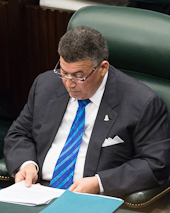
NBF grants 3x$ scholarships
 (CNS): Some students who received education grants from former premier McKeeva Bush’s controversial Nation Building Fund (NBF) were receiving three and a half times the maximum scholarship given to students through the normal procedure administered by the Education Council. Several of the students receiving annual grants of around $70k are related to UDP members, including the former political advisor to Bush, the party leader. Premier Alden McLaughlin reluctantly revealed more details in the Legislative Assembly on Thursday about the NBF as he wound up the debate on the Strategic Policy Statement (SPS) following criticisms from Bush regarding the PPM's plans to reduce the grants for the 2014 academic year in line with other scholarships.
(CNS): Some students who received education grants from former premier McKeeva Bush’s controversial Nation Building Fund (NBF) were receiving three and a half times the maximum scholarship given to students through the normal procedure administered by the Education Council. Several of the students receiving annual grants of around $70k are related to UDP members, including the former political advisor to Bush, the party leader. Premier Alden McLaughlin reluctantly revealed more details in the Legislative Assembly on Thursday about the NBF as he wound up the debate on the Strategic Policy Statement (SPS) following criticisms from Bush regarding the PPM's plans to reduce the grants for the 2014 academic year in line with other scholarships.
During his long response to the SPS, which focused mostly on his concerns about what he called the neo-colonialism of the UK and their unlawful tapping of his phone, Bush, now the opposition leader, also accused McLaughlin of not wanting to help Caymanian students and of playing politics by pulling the scholarship funding from those who received the grants under the NBF.
However, the premier hit back and said that so far the PPM had been discreet about what had really gone on with the NBF scholarships because it involved young people but the opposition leader’s criticisms of the government’s decision to regularize the grants demanded that he reveal the truth. Despite efforts by Bush to stop him on a point of order, the speaker pointed out that there was no point of order and allowed the premier to continue with the revelations, which were supported by documentation.
“It would be hard to conceive of a more disastrous programme or disastrous set of circumstances surrounding these grants,” McLaughlin stated. “There was little in terms of a system and the premier was the person deciding who got the scholarships.”
Pointing out that the fund would be the subject of an auditor general’s report, he said the scholarships have been given to some students who are not attending any institutions; ones for colleges that didn’t even exist and some students were receiving grants from other government sources as well as the NBF. He pointed to at least four students who were getting over $70,000 per year, more than three times the $20,000 annual maximum given to students on Education Council scholarships.
McLaughlin said the decision on who got what was made entirely by the former premier, with no proper systems in place. When a committee was finally established, he said, there was no one on it with education experience, and Bush still made the decision. The premier also revealed that when a proper application form was eventually drawn up with criteria that capped the scholarships at $25,000 per year, he still allowed the children of political supporters to go way beyond that.
McLaughlin said the grants were decided on the basis of who was able to speak to Bush, the premier at the time, and pointed to many grants being given to people directly associated with the UDP.
The premier said government was not stopping the funding because of politics, even though they had been given out under political circumstances; it was to create a level playing field. He explained that the students were still receiving the amounts they had been promised during this academic year, but next Autumn the grants would be reduced to $20,000, as it was blatantly unfair that the daughter of a UDP supporter got $70,000 per year to go to high school while other students in Cayman were waiting to get anything at all.
“There are students that can’t get a scholarship at all under the regular programme because the scholarship they should have got has been spent on students who got them under the Nation Building Fund with no checks and balances,” he said. “It was a complete and utter shambles,” the premier added as he described what his government found when they began to examine what was going on. “The then premier operated this out of his back pocket.”
McLaughlin suggested that the opposition leader had no grounds to criticise the current government for trying to regularize and create some equality, and with more than $13 million in the current budget for scholarships, the administration could hardly be described as not wanting to help Caymanian students. He also pointed to his own vision and commitment to education, which he said he was still taking licks for.
The review of the NBF scholarship, the premier said, was about the "inequity inherent in this programme”, which has given a small number of students huge sums of money while disadvantaging others. “It should not be down to which party you support; it should be on merit.”
McLaughlin challenged Bush to present the evidence that this programme was fair and transparent and he was not politically involved in every single grant. The way the NBF grants were given, he said, was the best example of how to destroy a nation rather than build it because favouring people on the basis of support for a politician instead of merit was divisive.
“We are not insensitive that these are young people with drive and that’s why we are not cutting off funding, but it can’t be on a different basis and we can’t continue a system not based on merit but how well you knew the premier.”
Although Speaker of the House Juliana O'Connor-Connolly had prevented Bush from interrupting the premier, when he had finished she allowed Bush to make a short statement, in which he said there was a committee of three people from his office and that applications for the NBF grants were referred to his chief of staff.
He said his only involvement was the final approval. The goal, he said, was to help as many people as possible and there were circumstances where some students needed more funding than others. In those circumstances, Bush said, a decision was taken depending on the benefits that may follow for the country.
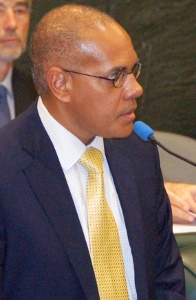
CIG to move financial year
 (CNS): The government has made the decision to move its fiscal year, which currently runs from 1 July through to 30 June, to match the calendar year. Announced by Finance Minister Marco Archer when he delivered the PPM government’s future fiscal plans and related policies, the change will begin on 1 January 2016. Simultaneously, government will be introducing multi-year budgeting, which will see an 18 month budget delivered at the end of this fiscal year followed by a two year budget on 1 January 2016. Despite the complexities and expense of changing the fiscal year, Archer said it would bring numerous benefits.
(CNS): The government has made the decision to move its fiscal year, which currently runs from 1 July through to 30 June, to match the calendar year. Announced by Finance Minister Marco Archer when he delivered the PPM government’s future fiscal plans and related policies, the change will begin on 1 January 2016. Simultaneously, government will be introducing multi-year budgeting, which will see an 18 month budget delivered at the end of this fiscal year followed by a two year budget on 1 January 2016. Despite the complexities and expense of changing the fiscal year, Archer said it would bring numerous benefits.
Delivering the Strategic Policy Statement (SPS) in the Legislative Assembly on Thursday morning, the finance minister said the beginning of 2016 was earliest possible opportunity to make the fiscal year change but it would bring several advantages.
Government collects the bulk of its revenue from the financial services sector between January and March, he noted, so government will start its year when money is coming in but it will know early on in the fiscal year if there is a fall-off in revenue, giving government more time to take action. Archer explained that currently, with the fiscal year beginning on 1 July, it is nine months into the year before it is known that there may be a problem in the area where it collects most of its earnings.
The minister pointed out that the transition would avoid the current problem of producing two sets of statistics for both the calendar year and the fiscal year, facilitating clearer public information on government finances and the economy.
Archer said that the changes would be reviewed frequently and systematically but the longer budgets will see government take a more medium term view of public finances, which he said was superior to the start-stop of the current single year budgets.
The minister announced the formation of a new committee to undertake a comprehensive review of the Public Management and Finance Law led by government back-bencher and chair of the Public Accounts Committee, Roy McTaggart. As well as focusing on core government, the PMFL review will also examine statutory authorities and government companies, he said.
The PMFL will need to be changed to switch the financial year, which will also see the issue of the local election cycle resolved. Although it would have been cheaper to change the election date, the political issue of an administration gaining or losing six months appears to have been insurmountable, leading to what will be a much greater undertaking on the part of government to change the fiscal year.
Check back to CNS for more on the SPS and the LA motion for debate on it moved by the premier.

Ethics board still waiting to be taken seriously
 (CNS): The seventh report of the Commission for Standards in Public Life, made public on Monday when it was tabled in the Legislative Assembly some three months after it was written, demonstrates that the ethics watchdog is still struggling to be taken seriously. Despite the many concerns raised since its formation in early 2010, very few of the commission’s recommendations have been acted upon and it is still waiting on the necessary legislation to give it teeth and the power to deliver on its constitutional mandate. The report also reveals significant concerns about the continued problems on public authority boards and the failure of member to be held accountable or reveal their potential conflicts of interest.
(CNS): The seventh report of the Commission for Standards in Public Life, made public on Monday when it was tabled in the Legislative Assembly some three months after it was written, demonstrates that the ethics watchdog is still struggling to be taken seriously. Despite the many concerns raised since its formation in early 2010, very few of the commission’s recommendations have been acted upon and it is still waiting on the necessary legislation to give it teeth and the power to deliver on its constitutional mandate. The report also reveals significant concerns about the continued problems on public authority boards and the failure of member to be held accountable or reveal their potential conflicts of interest.
Ironically, late delivery of its reports to the LA and ultimately the public is the first issue dealt with in the commission’s report. It points out that during the period before it was written the ethics board had repeated the request that its reports are, as required by the constitutional mandate, laid before the Legislative Assembly as soon as possible. Despite the commitments made by the authorities concerned that the reports would be submitted on a timely basis, this report still took more than threemonths to be presented and made public.
“During the previous reporting session the Commission was concerned by the amount of time it was taking for its reports to be tabled in the Legislative Assembly,” the report noted. “The Commission maintains the view that there is no reason why the reports should not be submitted directly to the Legislative Assembly.”
In an effort to speed up their publication the commission said it took steps to obtain the advice of the attorney general and met with the former speaker of the House about the necessity for the reports to go to the deputy governor and then to Cabinet before they went before the Legislative Assembly.
However, these efforts appear to have been in vain as the report, which was only made public this week, is now more than three months old.
As well as concerns over the delay in the report’s public circulation, the commission is still waiting for the law, which it highlighted as a priority in 2010 with the publication of its first ever report. Now, well over three years later, the draft bill has only just reached the LA and is open for public scrutiny. The final draft had been submitted to the deputy governor almost twelve months ago and put before the minority PNA government following the fall of the UDP administration. However, it did not make it through the ministerial meetings and was deferred a number of times. It is not clear of it was rejected by the five ministers at the time or whether it was simply not discussed.
As a result, the proposed law languished as the country was sucked up into the election campaign. Following the PPM's election to office however, the bill has since been steered through Cabinet and is expected to be debated in January. The commission said it was encouraged by the approach of the newly elected government and its commitment to enact the legislation.
“Since taking office, the new administration has indicated a strong willingness to ensure the SPL Bill is passed into law,” the report states.
Among the many other issues that the commission raises in this latest report, many of which have been repeatedly raised in previous reports — and apparently repeatedly ignored — is the pressing need to deal with the boards of government companies and statutory authorities, where at best conflicts of interests and at worst actual corruption have been repeatedly highlighted by the local media and the auditor general, but nothing has been done.
“The Commission strongly believes that requiring all persons in public life to declare their interests and to take appropriate steps, such as not participating in the discussion or decision making process and leaving the meeting during such conflicts, when a conflict arises will bring much needed transparency to the real and perceived conflicts of interest that are present currently on a number of boards and committees,” the report reveals. It goes on to express further concern that board members must be properly appointed and "must be held accountable for their actions and decisions".
The commission said it remained committed to its ongoing efforts to establish procedures for appointing members to public authorities, and the terms of such appointments.
The commission states that the register of interest for boards should show current or future conflicts of interests and the declarations should become public documents.
See full report below and proposed bill

Community urged to help stamp out corruption
(CNS): In its annual report for the fiscal year 2012-2013 the Anti-Corruption Commission (ACC) is calling on the people to help by reporting wrongdoing and taking a stand against corruption. ACC Chair David Baines, the RCIPS Commissioner of Police, states that corruption exists at all levels and fighting the complexities associated with this type of crime requires ownership of the problem by a cross-section of the community. The report reveals that since its establishment the commission has so far only achieved one conviction, which was against an RCIPS civilian staffer who gave out information from a database. However, at the end of the last fiscal year there were 19 active cases and two people awaiting trial in the Grand Court.
Although the report gives no details regarding the cases it is investigating or any information about the 31 complaints it has received, it reveals that twelve letters were served for the production of warrants during the last fiscal year and that 82 interviews were conducted, with 14 reports being filed with the legal department.
Looking ahead, the report indicates that the commission has a difficult job in securing convictions and highlights the increasingly complex approaches required to intervene and prevent corruption but points to the need for public authorities to do their part.
“The ACC will continue to actively do their part to receive and investigate allegations of corruption in line with the Anti-Corruption Law (2008,” the reports states. “In combination with the Commission’s efforts, however, the ACC calls on public authorities to demonstrate their stance against corruption by taking a committed interest in the implementation of strategies, including greater internal controls, staff training, and the building-up of an organisational culture marked by professionalism, integrity, and ethically-sound decision-making."
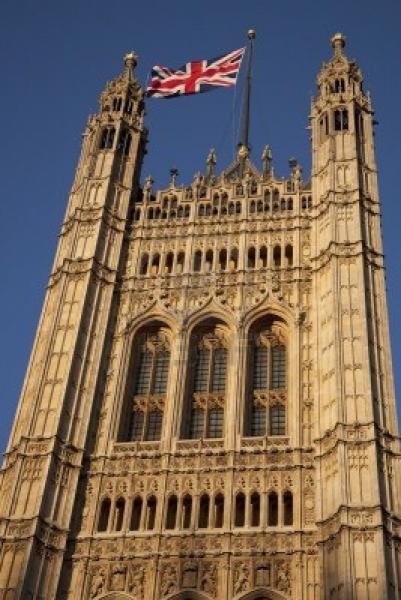
Premier to take just four delegates to JMC
 (CNS): Premier Alden McLaughlin will be leading a small government delegation to Britain with him at the weekend when he leaves the Cayman Islands Saturday to attend the annual Overseas Territories Joint Ministerial Council (JMC) in London. Wayne Panton is the only other minister on the trip, and three civil servants will also be going: Cabinet Secretary Samuel Rose; the JMC “Sherpa”, Jennifer Ahearn; and Home Affairs Chief Officer Eric Bush. The delegation will be gonefor just one week and there are no other trips planned to other countries by the government officials either before or after the London meeting, which is hosted by the FCO. The governor, Helen Kilpatrick, will also be attending the annual meeting.
(CNS): Premier Alden McLaughlin will be leading a small government delegation to Britain with him at the weekend when he leaves the Cayman Islands Saturday to attend the annual Overseas Territories Joint Ministerial Council (JMC) in London. Wayne Panton is the only other minister on the trip, and three civil servants will also be going: Cabinet Secretary Samuel Rose; the JMC “Sherpa”, Jennifer Ahearn; and Home Affairs Chief Officer Eric Bush. The delegation will be gonefor just one week and there are no other trips planned to other countries by the government officials either before or after the London meeting, which is hosted by the FCO. The governor, Helen Kilpatrick, will also be attending the annual meeting.
The JMC is designed to bring leaders from the territories and the FCO’s OT minister and other UK cabinet officials together to provide a forum for the exchange of views on political and constitutional issues between the territories and the UK government.
“Our goal in the Cayman Islands is to build sustainable economies, create jobs and drive prosperity,” said McLaughlin. “Once we do these things, we can ensure a better quality of life for our citizens and visitors.”
The JMC takes place between the 25-29 November and discussions on strategies for promoting the security and issues such as good governance in all the overseas territories as well as economic diversification, attracting investment, vocational education and employment will be on the agenda. During the JMC, participants will also review and implement strategy and commitments in the 2012 White Paper ‘The Overseas Territories: Security, Success and Sustainability’.
On Tuesday night the premier will host an invitation-only dinner for current and potential future Friends of Cayman at the InterContinental Hotel, Westminster, where he will deliver a speech and answer questions.
A major UK-Overseas Territories Business Forum will also be held alongside the JMC on 28 November. The event will provide an opportunity for the overseas territories delegates to meet with UK businesses and investors to explore opportunities in all of Britain’s territories.
The delegation will be gone for one week and will return to Cayman on Saturday, 30 November.
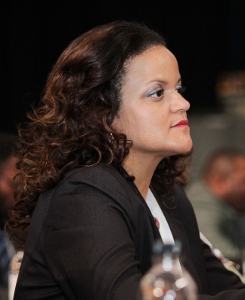
Petition appeal thrown out
 (CNS): The Cayman Islands Court of Appeal has refused to hear an application against the chief justice's decision in relation to a challenge to the election of the education minister to her West Bay seat. Despite the arguments put forward by the legal team representing John Hewitt, who filed the original failed petition against Tara Rivers, that the decision was not in accordance with the law, the higher court found that they did not have jurisdiction. According to the Cayman Constitution 2009, the decision of the Grand Court is final when it comes to an election petition and the appeal court was unsympathetic to Hewitt's attorneys' position that the CJ had misinterpreted the constitution to such an extent that there had to be grounds of appeal.
(CNS): The Cayman Islands Court of Appeal has refused to hear an application against the chief justice's decision in relation to a challenge to the election of the education minister to her West Bay seat. Despite the arguments put forward by the legal team representing John Hewitt, who filed the original failed petition against Tara Rivers, that the decision was not in accordance with the law, the higher court found that they did not have jurisdiction. According to the Cayman Constitution 2009, the decision of the Grand Court is final when it comes to an election petition and the appeal court was unsympathetic to Hewitt's attorneys' position that the CJ had misinterpreted the constitution to such an extent that there had to be grounds of appeal.
After pointing out that the appellant had a high hurdle to cross, the three judges struck out the appeal and stated that they would deliver their reasoning in full before the end of the session.
The judges grappled with the question of the Grand Court decision being the final decision in circumstances where a Grand Court judge had decided unlawfully, but they appeared satisfied that finality in this case stopped at the local court.
Graham Hampson, who was representing Tara Rivers at the appeal, made an application for costs, as did the Reshma Sharma from the Attorney General's Chambers. Hampson explained that costs had not been settled in the previous case as the chief justice had indicated that he did not necessarily think an order was appropriate in the original petition but that remained undetermined.
The Court of Appeal agreed to costs for Rivers but told the AG's attorney that it was a public interest issue and the attorney general's appearance should be borne by the public purse.
The appeal court ruling settles the matter of whether or not Rivers was duly elected. As such, it also confirms the CJ's ruling that Rivers was attending an educational institution for the purposes of study when she was working as an associate lawyer with Alan Overy and that her possession and use of an American passport and her dual nationality does not constitute allegiance to another country.
This opens the door for future candidates previously excluded as a result of dual nationality or for those who have been overseas during the prescribed period before an election to still run if they can demonstrate that they had embarked of some form of training or education during their absence.
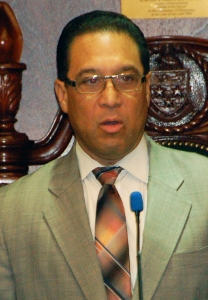
Premier presses for parliamentary independence
 (CNS): The country’s seat of democracy is still controlled by the deputy governor’s office, but Premier Alden McLaughlin believes that needs to change and is pressing for the independence of the Legislative Assembly from the administrative arm of government. Speaking at a special seminar organised by the local branch of the Commonwealth Parliamentary Association (CPA) designed to help MLAs better understand parliamentary procedure and rules at the Legislative Assembly, McLaughlin said that the Standing Orders, the regulations that govern the procedures, need to be modernised. The seminar offered an opportunity for MLAs to discuss making the LA an autonomous body and removing the direct link to the civil service.
(CNS): The country’s seat of democracy is still controlled by the deputy governor’s office, but Premier Alden McLaughlin believes that needs to change and is pressing for the independence of the Legislative Assembly from the administrative arm of government. Speaking at a special seminar organised by the local branch of the Commonwealth Parliamentary Association (CPA) designed to help MLAs better understand parliamentary procedure and rules at the Legislative Assembly, McLaughlin said that the Standing Orders, the regulations that govern the procedures, need to be modernised. The seminar offered an opportunity for MLAs to discuss making the LA an autonomous body and removing the direct link to the civil service.
Ezzard Miller, the independent member for North Side, said that the three elements of government — the parliament that makes the laws, the civil service which implements them and the judiciary which upholds them — had to function independently and separately from each other, so it was wrong for the executive arm of government to control the management and budget of the legislature.
The members of the LA were offered presentations from local attorney Steve McField, and overseas contributors included Speaker of the Trinidad and Tobago House of Representatives, Wade Mark; Speaker of Bermuda’s House of Assembly, Randolph Horton; Speaker of Dominica’s House of Representatives, Alix Boyd-Knight; and Clerk of Jamaica’s Houses of Parliament, Heather Cooke.
Cayman’s own speaker, Julianna O’Connor Connolly, also took part in the presentations. Senior MLAs provided tips and assistance to the new members, adding value to the discussions and debates emanating from the proceedings.
The CPA Secretariat’s Assistant Director of Communications and Research, Arlene Bussette, summed up the purpose of the two-day session. She said the core CPA programme aims to build capacity in newly elected MLAs to help them meet their democratic duties effectively and efficiently, while also serving as a refresher course for returning parliamentarians.